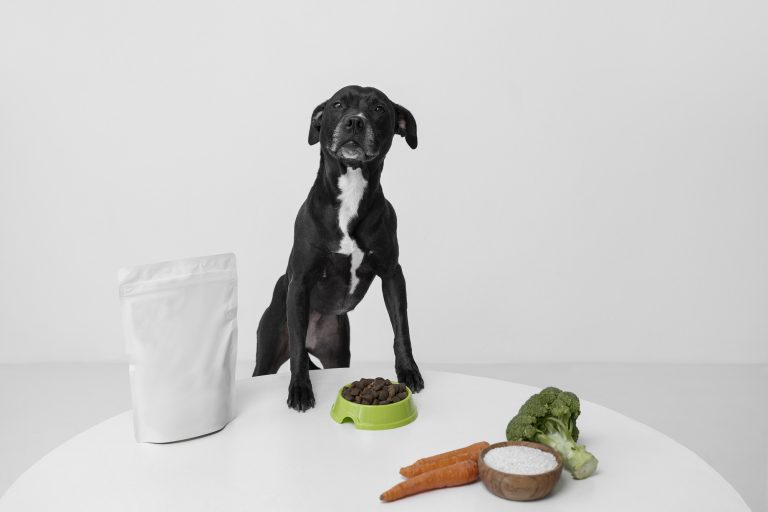Hypoallergenic dog food has become an increasingly hot topic among pet lovers, reflecting a significant shift in our attitude towards canine nutrition. With more and more dog owners eager to ensure a healthy and happy life for their four-legged friend, this type of specially formulated food is becoming increasingly popular and relevant.
But when is hypoallergenic dog food really recommended? In the following, we will explore this question, highlighting the situations in which this nutritional option becomes essential for the health and well-being of our pets.
CONTENT:
- What is hypoallergenic dog food?
- Benefits of this type of dog food
- When hypoallergenic dog food is recommended
What is hypoallergenic dog food?
Hypoallergenic dog food is a specialized nutritional approach developed to meet the needs of dogs with food sensitivities or allergy predispositions. This category of food is distinguished by careful formulation, taking into account the need to minimize the risk of adverse reactions to the pet’s immune or gastrointestinal system.
The main features of this dog food include the use of limited ingredients, which means they are carefully selected to avoid potential allergens. This often includes controlled-release proteins such as lamb or chicken, which are considered less likely to cause allergic reactions compared to more common protein sources such as beef or poultry.
Additionally, this food can be formulated without certain common ingredients that are known to be common in regular dog diets. For example, excluding wheat, soy or other grains can help reduce the risk of adverse reactions in the digestive tract or skin.

Benefits of this type of dog food
Hypoallergenic dog food offers numerous health benefits for pets, especially for dogs with food sensitivities or allergy predispositions. Here are some of the main advantages of hypoallergenic dog food:
-
Reduces the Risk of Allergic Reactions
Hypoallergenic food is formulated to minimize the presence of ingredients that can cause allergic reactions in dogs. Excluding common allergens such as wheat, soy or beef significantly reduces the risk of side effects such as itching, rashes and digestive problems.
-
Improves Skin and Coat Health
Many dogs with food allergies show skin problems such as dermatitis or persistent itching. Hypoallergenic food often contains ingredients that support skin and coat health, contributing to a brighter appearance and reducing skin irritation.
-
Optimizes the Functioning of the Digestive System
Hypoallergenic formulas can include easily digestible ingredients and controlled-release proteins, which help maintain a healthy digestive system. For dogs with food intolerances or gastrointestinal problems, this can be an excellent choice to avoid digestive discomfort.
-
Weight and Allergen Control
Manufacturers often formulate hypoallergenic food to control calories and provide balanced nutrition. This can help maintain a healthy body weight and control potential allergens, helping to avoid health problems related to obesity or malnutrition.
-
Supports Dogs With Genetic Predisposition to Allergies
Certain dog breeds are prone to food allergies or sensitivities. Hypoallergenic food can be a strategic choice for these breeds, helping to prevent or manage potential health problems associated with allergic reactions.
-
Contributes to a Long and Healthy Life
By providing the right diet for your dog’s individual needs, hypoallergenic food can help maintain overall health and promote a long and active life for your pet.
It is important to note that before transitioning to a hypoallergenic diet, you need to consult a veterinarian to correctly identify your dog’s specific nutritional needs and receive personalized recommendations based on his health status.

When hypoallergenic dog food is recommended
Hypoallergenic dog food is crucial for addressing the specific needs of dogs with food sensitivities or allergies.
Consider transitioning to a hypoallergenic diet based on various factors. Below, we’ll explore when experts recommend this specialized food for your non-talking friend’s optimal health.
1. Obvious allergic reactions
When you notice obvious signs of food allergies in your dog, such as persistent itching, rashes or gastrointestinal problems, it’s time to consider a hypoallergenic diet. This can contribute to the identification and elimination of potential food allergens, thus reducing adverse reactions.
2. Recurrent food intolerances
Pets can develop food intolerances over time, and dogs are no exception. If you notice recurring digestive problems in your dog, a hypoallergenic diet may be the right solution to soothe his digestive system and prevent discomfort associated with food intolerances.
3. Diagnosis of food allergies
When a veterinarian has confirmed the presence of a food allergy or intolerance in your dog, hypoallergenic food can become an integral part of the strategy for managing these problems. Following your vet’s recommendations and choosing the right food for your dog’s specific needs are essential in this situation.
4. Breeds prone to allergies
Certain dog breeds exhibit a predisposition to food allergies and sensitivities. If you have a dog that falls into this category, a transition to a hypoallergenic diet can be an effective preventative measure.
5. Chronic skin problems
Dogs with chronic skin problems, such as dermatitis or frequent skin infections, may benefit from a hypoallergenic diet. Hypoallergenic formulas often include specially selected ingredients to support skin health and reduce inflammation, helping to maintain healthy skin.

In conclusion, hypoallergenic dog food is a specialized solution for managing and preventing adverse reactions in the digestive system and skin. Pay attention to your dog’s signals and consult a vet for personalized nutritional advice.

